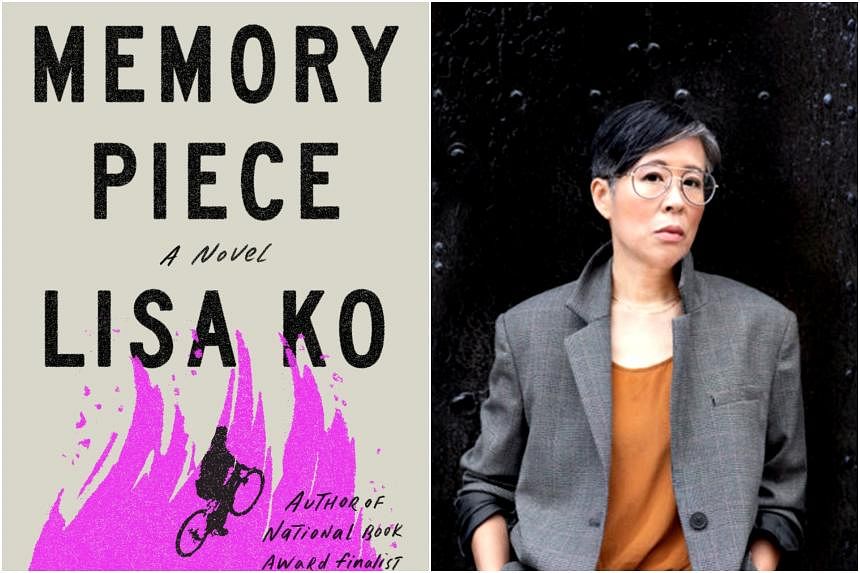Memory Piece
By Lisa Ko
Fiction/Riverhead Books/Paperback/304 pages/$30.51/Amazon SG (amzn.asia/d/fNR66EQ)
4 stars
Three lonely girls, three separate social circles, three divergent ambitions. They are brought together by a Fourth of July barbecue in 1983 and a yearning for a greater purpose.
Even as the narrative swells and splinters, following these Asian-American girls as they careen down different paths – to a cemetery, into one temporary home after another, through the turn of the millennium and then four decades into the future – their stories remain threaded together by an enduring childhood bond.
American novelist Lisa Ko’s second novel, Memory Piece, is a time capsule of friendship, romance, queerness, Asian-American identity, gentrification, capitalism, the tech boom and bust.
It is a lot to pack into 300 pages and the only reason the story does not crack under the weight of its own ambition is because Ko is able to craft three fully fleshed-out, chaotically human vessels through which to explore this cornucopia of ideas.
Each protagonist has a stylistically distinct section.
Performance artist Giselle Chin’s journey out of obscurity is punctuated by her artistic manifestos. The omission of quotation marks thrusts readers into coder Jackie Ong’s stream of consciousness. Social activist Ellen Ng’s first-person chapters are short and assertive. Like her, they do not linger in one place for long.
Giselle and Jackie are shaped, in part, by their complex familial relationships, which are explored at some length in the novel.
Giselle’s subdued home life forces her to seek excitement elsewhere – by pushing the boundaries of creative expression. Jackie, an only child, grew up privileged but lonely, turning to computers for company. Both grapple with integrity and the faltering promise of their youthful passions as they get sucked into the more sinister side of their industries.
Meanwhile, Ellen flits in and out of their orbits: To Giselle, she is an elusive presence, dropping in only occasionally to interrogate her art-making process and tease her for being a “Bad Asian”. She concretises in Jackie’s section – first as a friend, then roommate, lover, stranger and friend again.
By the time Ellen’s first chapter arrives 170 pages in, readers have a vague idea of who she is, but not enough to pick up where the plot left off 40 years earlier. Having to get reacquainted with her ever-expanding cast of friends this late into the novel feels like a bit of a slog.
On top of that, readers are suddenly plunged into a dismal future world overrun by gentrification. In contrast to the detailed, lived-in tapestry Ko weaves of the 1980s and 1990s, her exposition-heavy approximation of 2040s New York feels tedious and hollow.
Giselle and Jackie appear then only in memories, which is not necessarily a bad thing. Friends grow distant over time and Ko consistently confronts the vicissitudes of friendship with unflinching frankness.
For instance, Giselle muses about “feeling guilty around Jackie for some reason” and being unable to reach Ellen. Later, Jackie wonders if her friends will abandon her for being withdrawn, reflecting that there are “rules for relationships and she doesn’t know them”.
Yet, when they do meet, they slide back into their old camaraderie with the ease of lifelong friends.
Still, this reviewer never quite gets a sense of what binds the women together as a trio. Apart from a brief prank-calling session at the introductory barbecue, they do not spend any time together as a group until they raid an abandoned warehouse midway through the story.
Perhaps it is enough that their lives unfold in tandem, through snatches of gossip exchanged at two-by-two meet-ups, such that when the reader stands back and squints, he or she can vaguely make out the impression of a whole.
Perhaps there was simply not enough time. While Giselle can spend a year on each project, Ko does not have that luxury. Like an archivist, she straddles past and future, shaping these memories into a tale of grit and girlhood that at once disturbs, resonates and warns.
If you like this, read: Tomorrow, And Tomorrow, And Tomorrow by Gabrielle Zevin (Knopf Publishing Group, 2022, $21.59, Amazon SG, go to amzn.asia/d/9JoHAkA). This story, set over the course of several decades, follows three friends as they enter the world of video game design.


